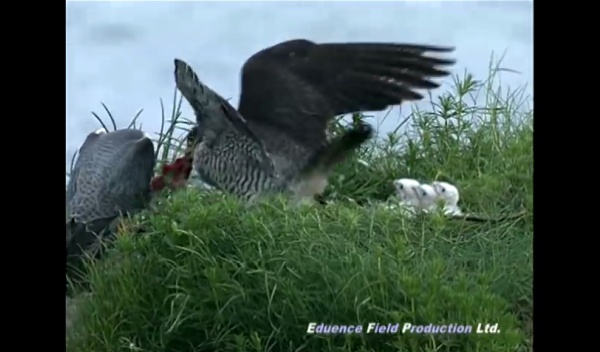
Most of us have never seen peregrines nesting at wild cliffs so it’s a real pleasure to find this excellent video from Hokkaido, Japan showing a pair nesting by the sea.
Click on the screenshot above to watch peregrines’ family life as the chicks grow up from ages two to five weeks.
Here’s what you’ll see:
- The male chases dense flocks of birds to separate out a single bird and capture it.
- 1st feeding, chicks 2 weeks old (This is C1’s age today at Pitt): The male brings food close to the nest but not into it. The female leaves the nest to take the prey and carries it back to the nest to feed the chicks. If you were watching this feeding on a nestcam you would not see the male at all and might mistakenly think the female does all the hunting. Nope.
- 2nd feeding, chicks 3 weeks old: The chicks have full crops showing as gray bulges on their throats. This is a sign they are well fed. (You can see this bulge already on C1’s throat when he is full.) The chicks are not very hungry so after their mother eats she takes away the leftovers to cache them.
- 3rd feeding, chicks 4 weeks old: The chicks are half brown with growing feathers. They rush at their parents to grab the food and eat it on their own.
- Ledge walking and learning to fly, 5 weeks old: One chick flaps and lands at the bottom of the cliff in the water. Notice that he can swim! He gets out of the water and climbs the cliff. 🙂
Nestcams see such a tiny piece of birds’ lives that you might misunderstand what’s going on.
Peregrines are fascinating when you watch them from the ground.
(screenshot from video by Eduence Field Production, Ltd)
Truly majestic. And to think they start off as fuzzy white balls of feathers. You’re right — nest cams are so limiting.
What a great piece of film. Your explanation made it even better. I can’t imagine how many fledglings are lost on that rocky cliff with roaring waves below. Seeing all three flying back for lunch was amazing. Thanks.
Beautiful and amazing!
Thank you for posting this.
Kate, this is truly a wonderful film. It is no wonder the peregrine falcons has captured my heart. Thanks again, Janet
Thanks very much for posting this video! I really enjoy learning about these amazing birds. It is fascinating to see this natural cliff nest, to see the falcons hunt and the young one managing in the water, then climbing up the rocks. Volume 3 came up after Vol. 2 and I watched that one, too. Vol. 3 seems to show the adults teaching the young falcons how to hunt. Wow!
Wow, glad we were able to see that!
What a treat to see this video. Thanks so much for posting it. We get wonderful close-up shots from our great webcam. And then to see them in flight and hunting is amazing.
Wow, that was incredible Kate. Thanks for sharing!!
There’s a vol. 1 as well, but it just shows a little bit of courtship, mating, and incubation. I’m amazed at how that photographer was able to keep the birds in frame when they were hunting – it can’t have been easy to keep up with the fastest bird on earth.
Thanks, Kate. That was fascinating. I was a little surprised to see how unprotected that nest seemed to be. What would the chicks–or even the parents–do in a bad storm?
Mari Anne, they hunker down
HAPPY BIRTHDAY KATE!! I feel truly blessed to know you. Hope you have many more. Janet
Thank you, Janet
Thanks, Kate. And Happy Birthday!
Kate, have you by any chance seen Terzo today? I have not, and a lot of people are saying they have not seen him either. Thanks Janet
Janet, you haven’t been watching carefully enough! 😉 Terzo has visited the nest many times today and has brought food during some of his visits: 9:40am, 9:53am, 12:51pm, 1:05pm, 2:07pm, etc., etc. It is VERY RAINY here so Hope is keeping C1 dry and warm between downpours. Terzo has to perch elsewhere so he’s the one getting wet.
THANK YOU KATE!!!! I guess everytime I looked it was Hope, and everyone on the eagle cam was saying they had not seen him all day. THANKS AGAIN!
Janet, tell everyone not to worry. Every time C1 is fed, Terzo is supplying the food. He has proven himself to be a good provider.
Terzo made an on-camera food delivery at 2:08PM & Hope chased him off – she knows where to stay dry!
Thanks, Donna.